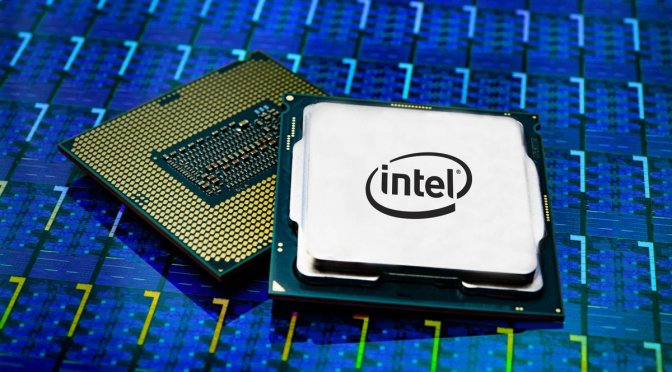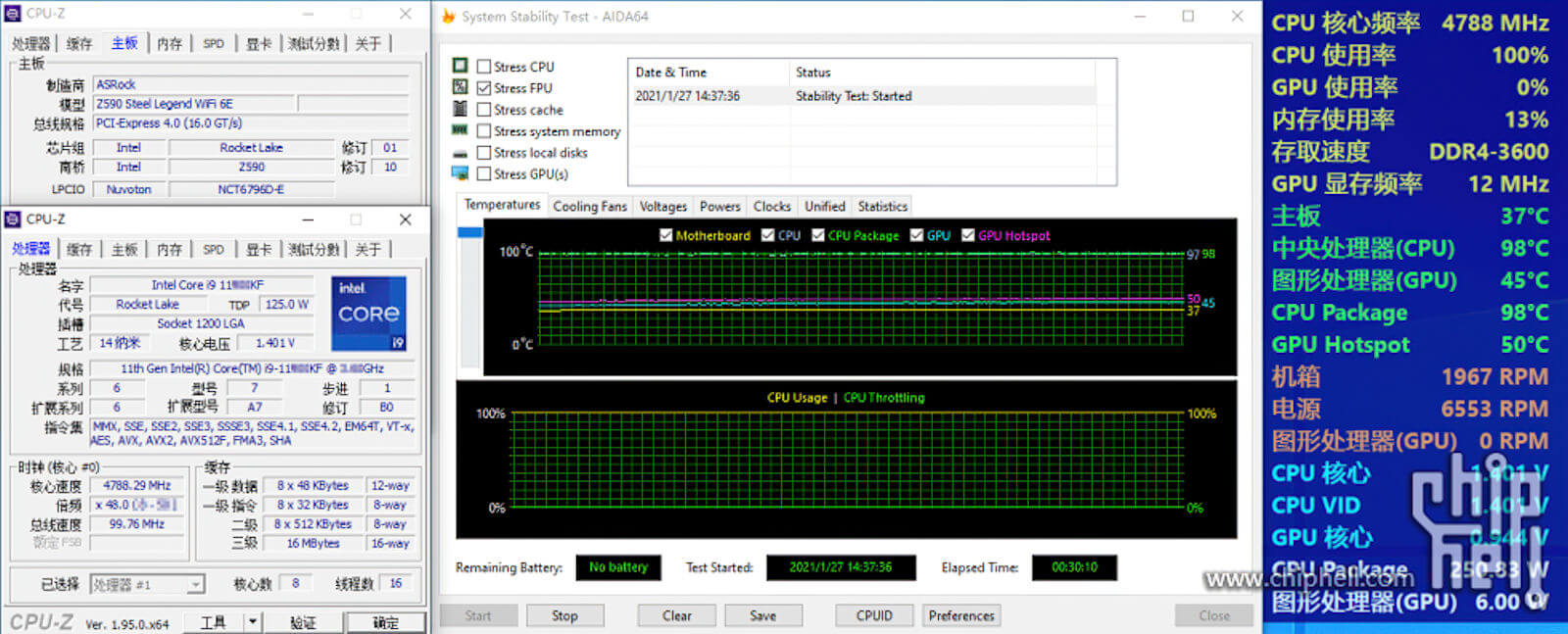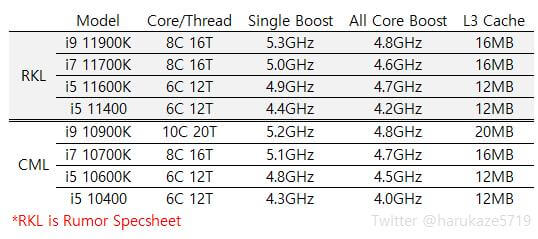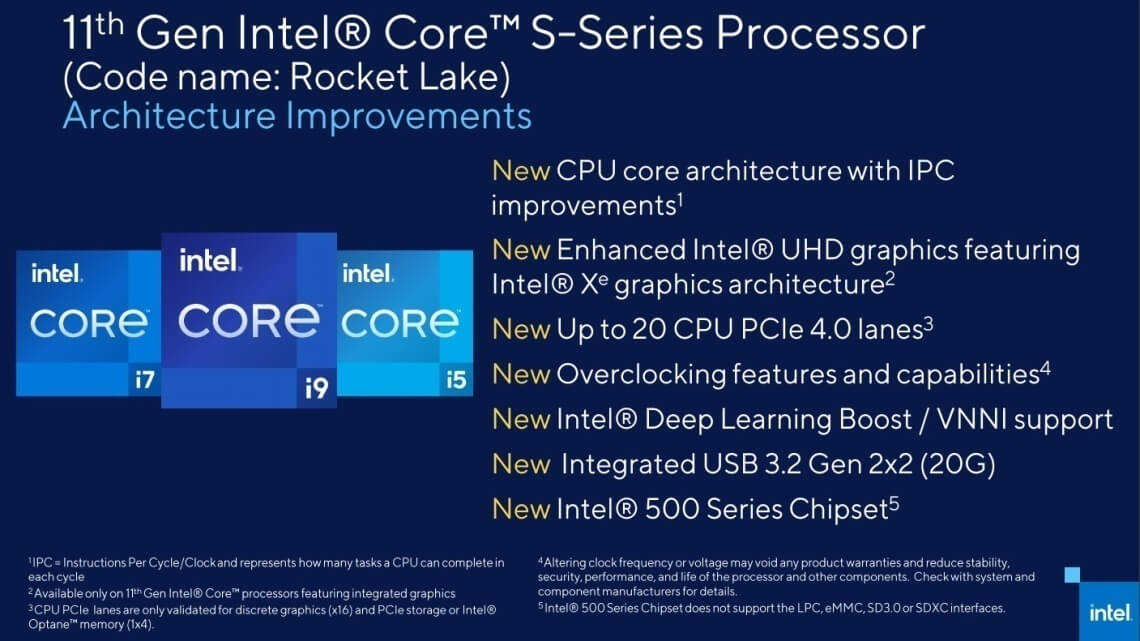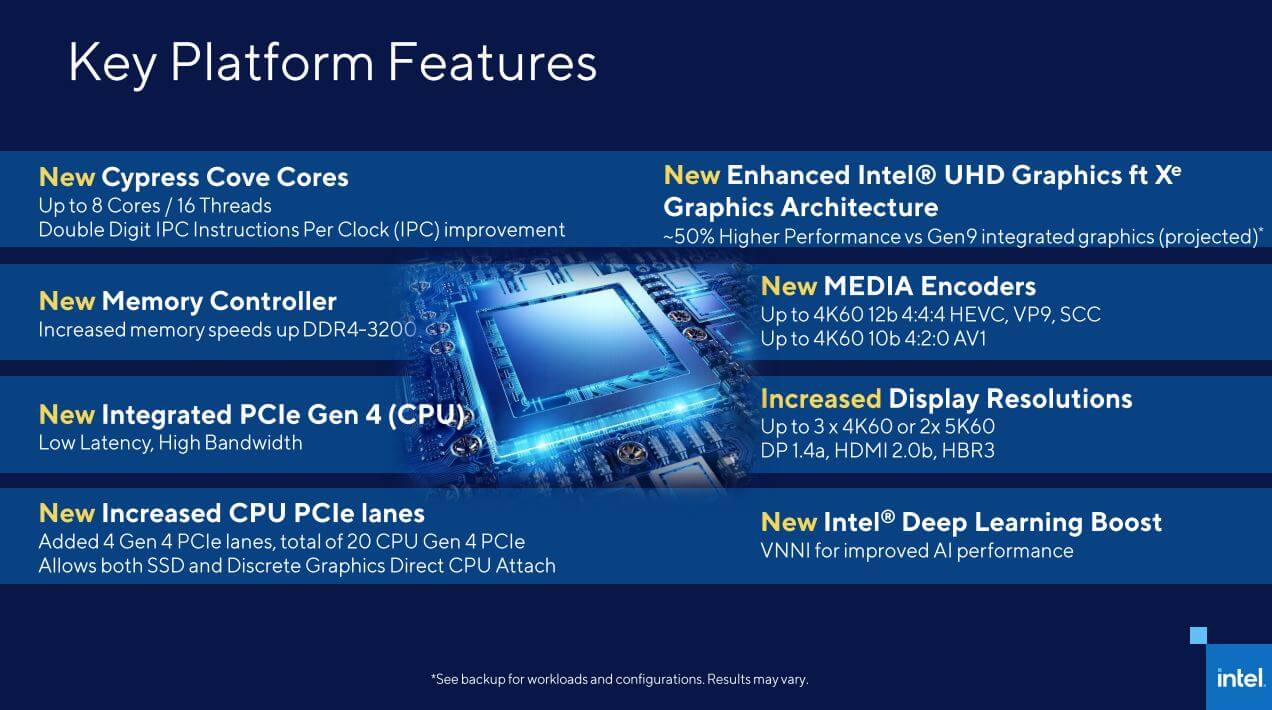At the recent CES 2021 event, Intel officially announced its 11th Gen Core Rocket Lake-S CPU series during the press briefing. Official announcement slides were leaked as well, which showed almost 14% IPC boost with this new CPU lineup.
Intel’s 11th gen desktop processor lineup will feature both Rocket Lake-S and Comet Lake-S “refresh” CPUs. The Intel 11th generation lineup includes 13 Rocket Lake/RKL and a total of 13 Comet Lake refresh desktop CPUs. Rocket Lake lineup features the core i9, i7 & i5 variants, while the Comet Lake refresh desktop CPUs will come in Core i3, Pentium & Celeron variants.
Now we have reports that the flagship Rocket Lake-S Core i9-11900KK processor might be one hot chip. According to some screenshots posted on Chiphell tech forums, coming via 9550pro (Twitter), this processor can heat up to 98C while under full load.
But before jumping on any conclusion, please bear in mind that there are a lot of variables which cannot be fully verified in this leak, so the actual real world and gaming CPU performance might differ.
But nevertheless, if these test results are to be taken seriously, then things aren’t looking that good for Intel’s upcoming Rocket Lake- S CPU lineup. The said Core i9-11900KF processor, which lacks iGPU, was stress tested by someone over at Chiphell and the CPU hit 98°C on all-core boost frequency of 4.80 GHz, even when a 360mm all-in-one liquid CPU cooler was used.
The AIO cooler struggled to keep the chip from hitting 100°C, as the core temperature was reaching 98°C, and the whole CPU package power reported a value of 250.83 Watts. AIDA64 FPU burn-in stress test was used. This CPU has a PL1 TDP value of 125 Watts, and 250 Watts is the PL2 state value, same as previous gen Comet Lake lineup.
We don’t have info on the duration or the “Tau” variable, but it appears that all three parameters, PL1, PL2, and Tau might have been altered or modified by the user.
TAU is a timing variable. It dictates how long a processor should stay in PL2 mode before hitting a PL1 mode, or before having to fall back to the “base” frequency.
Do note that Tau is not dependent on power consumption, nor is it dependent on the temp of the processor, because if the CPU hits a thermal threshold limit, then a different set of low voltage/frequency value curves are used and PL1/PL2 is discarded.
PL1 is the expected steady state power consumption of any processor (long term). The PL1 is usually defined as the TDP of a processor. So suppose if the TDP is 60W, then PL1 is 60W.
PL2 on the other hand is the short-term maximum power draw for a processor. This number is higher than PL1, and the processor will go into this state when a stress or workload is applied, allowing the CPU model to use its turbo modes up to the maximum PL2 defined value.
Coming back to the testing, the CPU-Z software correctly detects the processor. Possible causes of this CPU behavior and high temp value can also be attributed to one of the following, either a wrongly installed AIO liquid cooler, or the power stage PL2 was locked at 250 Watts for a very too long time, and/or there might be incompatible BIOS or some setting which applied a wrong voltage value etc.
Moreover, the CPU had a voltage of 1.401V during the test which is a wrong reading, because according to AIDA64 the value should be 1.325V. Based on the high voltage value, we are not sure whether this was a manual user setting, the chip’s VID itself, or whether the motherboard was trying to stabilize the 4.80 GHz clock speed.
Even a 360mm AIO liquid cooling solution was unable to keep the CPU temps in check. The flagship Core i9 11900K/KF CPU will have 8 cores, and 16 threads, versus 10C/20T found on the previous-gen Comet Lake Core i9-10900K CPU.
The Core i9 11900K SKU will have 5.3 GHz as the single core boost clock value, and 4.8 GHz as an all-core boost value, along with 16 MB of L3 cache. The base clock is expected to be around 3.5 GHz.
Rocket Lake-S desktop platform should also hopefully be the last CPU architecture to be based on an advanced 14nm process node. Comet Lake-S was also fabbed on this aging process node, which has held Intel back in terms of IPC uplift and efficiency gains over AMD’s Ryzen lineup.
RKL processor family will release in first quarter of 2021, and is expected to share the same socket and motherboard compatibility as the current 10th Gen Comet Lake processors, thus providing an upgrade path even for those rocking the flagship Core i9-10900K Comet lake CPU.
Rocket Lake-S will be housed on the 500-series motherboards. Although the Rocket Lake-S lineup will be the last to feature the LGA1200 socket/Z490 chipset, Intel is planning a full range of chipsets, including workstation W580, high-end gaming Z590, H570, and budget-oriented B560 and H510 series. The current 400-series motherboard chipsets will also support these upcoming SKUs after a BIOS update.
Intel has also broadened the DMI interface, which connects the processor to the platform controller hub (PCH), from x4 to x8.
John Bonini (VP and GM of Client Computing Group Desktop, Workstation, and Gaming at Intel) has also confirmed that the 11th Gen Core series processors codenamed Rocket Lake will be Intel’s first lineup to support the PCI-Express gen 4.0 interface, a feature which has been seemingly missing in Intel’s client Desktop CPU platform for quite some time.
Rocket Lake will deliver desktop users up to eight cores and sixteen threads on the high-end, which means two cores and four threads less than the current Comet Lake processor lineup. But the reduction in core count could also mean that Intel plans to rely on increased single-threaded performance, thus boosting overall system performance through single-threaded gains.
Single-threaded performance will help Intel to compete more in the CPU market segment, even if AMD can deliver higher core count SKUs. Not all applications or tasks are highly multi-threaded in nature, which makes the single-threaded performance all the more important.
Stay tuned for more tech news!
Hello, my name is NICK Richardson. I’m an avid PC and tech fan since the good old days of RIVA TNT2, and 3DFX interactive “Voodoo” gaming cards. I love playing mostly First-person shooters, and I’m a die-hard fan of this FPS genre, since the good ‘old Doom and Wolfenstein days.
MUSIC has always been my passion/roots, but I started gaming “casually” when I was young on Nvidia’s GeForce3 series of cards. I’m by no means an avid or a hardcore gamer though, but I just love stuff related to the PC, Games, and technology in general. I’ve been involved with many indie Metal bands worldwide, and have helped them promote their albums in record labels. I’m a very broad-minded down to earth guy. MUSIC is my inner expression, and soul.
Contact: Email

